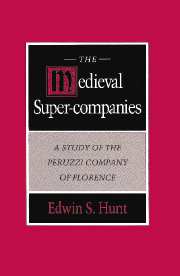Conclusions
Published online by Cambridge University Press: 08 October 2009
Summary
We have seen in the course of this study that the super-companies, unlike their smaller brethren, were separate and distinct from their eponymous families, despite their close connections. Here, the considerable mingling of company and personal affairs involved not merely family members, but all owners and, to a lesser extent, even the employees. Nonfamily members had the same access to the company's resources as did the Peruzzi family partners. If Giotto de' Peruzzi seems to have taken excessive advantage of his position in the company between 1315 and 1335, as reported in Table 6, so did the Soderini brothers between 1335 and 1343 (see Table A6). And if many members of the Peruzzi family remained wealthy after the crash, so did many of those of the other shareholders.
We have also noted that the super-companies did not attain their great size through the normal process of gradual growth over an extended period. In the case of the Peruzzi at least, they were created large to satisfy two special needs – large-scale supplies of foodstuffs and raw materials for the burgeoning industrial cities and large-scale cash for the ambitious rulers who controlled those commodities. For the Peruzzi and Acciaiuoli, the grain trade of southern Italy was the principal target and reason for being super-companies. The Peruzzi Company was not involved on the same scale in the other great commodity of medieval commerce, wool, until late in its history, while the Acciaiuoli was never a significant participant.
- Type
- Chapter
- Information
- The Medieval Super-CompaniesA Study of the Peruzzi Company of Florence, pp. 243 - 250Publisher: Cambridge University PressPrint publication year: 1994



